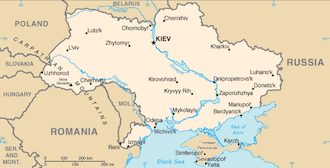The Ukrainian National Security Council today approved a new national military doctrine, formally declaring neighboring Russia to be a “military opponent” and making it a specific priority for the country to try to secure NATO membership .
 Ukraine had last issued a new military doctrine in 2012, and at the time made it clear that their policy was overwhelmingly defensive and aimed at maintaining the nation’s territorial integrity. The main focus at the time was in reforms toward increasing the efficiency of a military built around Soviet-leftovers.
Ukraine had last issued a new military doctrine in 2012, and at the time made it clear that their policy was overwhelmingly defensive and aimed at maintaining the nation’s territorial integrity. The main focus at the time was in reforms toward increasing the efficiency of a military built around Soviet-leftovers.
The National Security Council issued a statement confirming that the country is now abandoning its traditional position of non-alignment and instead wants “Euro-Atlantic integration,” while believing there is a “high likelihood” of a large-scale military conflict with Russia.
Since the perennial bankrupt Ukraine hasn’t got nearly the funds to fight a full-scale war against Russia on their own, it would make sense for them to try to align themselves with the more flush NATO nations in the region, trying to turn this “large-scale” conflict into World War 3.
Ukraine would never be accepted as a NATO member, however, both because it has existing territorial claims against Russia, and because it is in the middle of an unresolved civil war. NATO may be keen on needling Russia, but they could never get unanimous support for a new nation joining the alliance and immediately starting a huge war.
Ironically, Ukraine’s 2012 doctrine of defense and reform collapsed after two years, because a regime change turned them toward a more aggressive policy against the ethnic Russian east. The 2015 version seems destined for failure as well, since neither beating Russia in a full-scale war nor joining NATO is a realistic possibility.
Rather, it seems likely that the talk about Russia as a “military opponent” is an attempt at a concession to Ukraine’s ultra-nationalist parties, which are furiously condemning attempts to try to resolve the civil war, and have been eager to see the tensions with Russia escalate.


